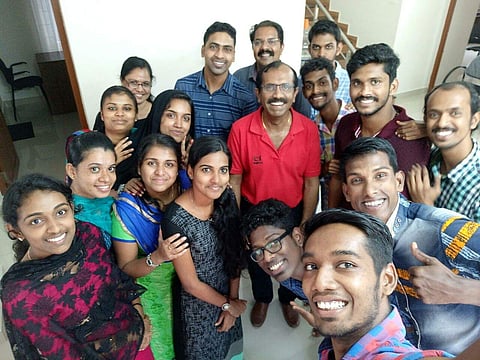

When the world is running to their work place at rush hour, do our differences matter? Here’s a question we do not need an answer to but to those prevailing stigmas, SS Jayasankar or Jay to those who know him built an answer with his life’s greatest work: Oorjja. The former mechanical engineer turned banking professional founded Oorjja, an ecosystem for differently-abled undergraduate students to acquire the skills necessary to gain employment, based on merit and as he strongly emphasises, not on the basis of sympathy.
Jay says, “Usually, in most spaces children who have special needs do not get the training that they deserve, so they may have more requirements than most children. It is after school that they truly lose a proper connection or interaction with the outside world. There are a lot of special schools but after passing out, they have no avenues to really become a functioning member of society. After 12, they aren’t usually trained with the capability or given the opportunity to succeed. There are multiple challenges they have to face in a job environment.”
Oorjja’s programmes include a range of subjects from Software Programming and Basic Accounting to Business Etiquette and Yoga. Jay explains, “If you look at families that may have a below average income, they often do not know what their children require. I noticed this gap and that is why i got involved. We primarily deal with children who are hearing impaired. I bring them here for around 6 months to a year for a training programme and create a professional environment for them to learn and adapt to becoming a part of a workplace and understand the skills required to play a good part in it.”
The first three months of the programme focuses on general training. The months following this are focused on specialising in a particular subject based on their area of interest and what the institute identifies as their subject of strength and competency. To help students understand how to work practically, they bring in experts from various areas and allow them to get involved with the students who learn how to interact in such specific environments.
The central aim of the programme is normalisation. To take this process forward, the organisation has established an internship programme. “I always encourage internships,” says Jay, adding, “The greatest challenge when it comes to all this is acceptance. When they mingle with the mainstream, it helps them merge into this system which has always tried to isolate them. Here, we offer interactions with peer groups and a safe learning environment where they do not need to be afraid of stigma.”
The programme is rigorous and time consuming enough to really get to know the students. The idea is to interact with them for a few months to learn their areas of strength and use it during the employment process. After the interning in their preferred area, they get placed as permanent employees in various companies. “We cant do this on a particularly large scale because wen eed to perfect the skills of the students, so it might just be a few students that we have but we ensure it’s done properly. We have trained 52 students over the past one and a half years, out of which 47 are already placed in various establishments.”
